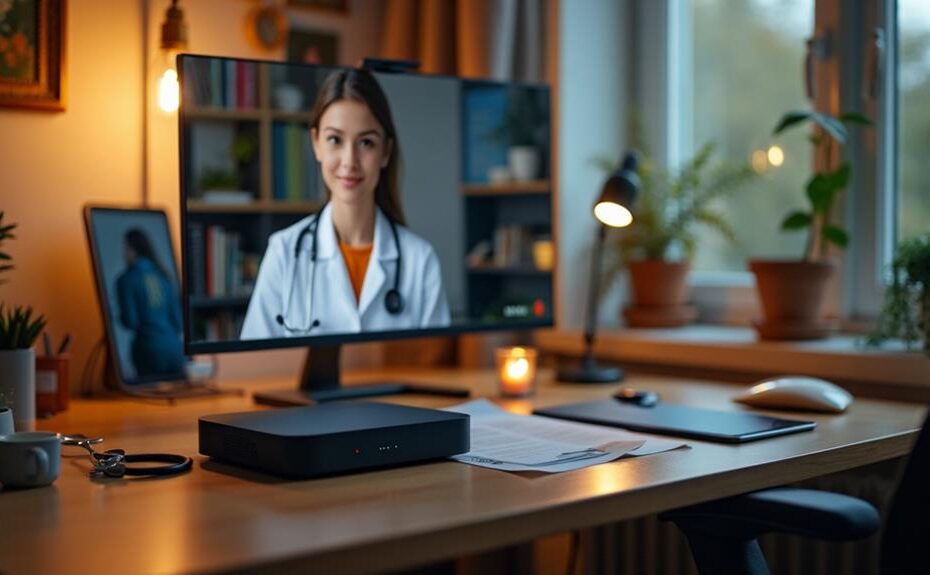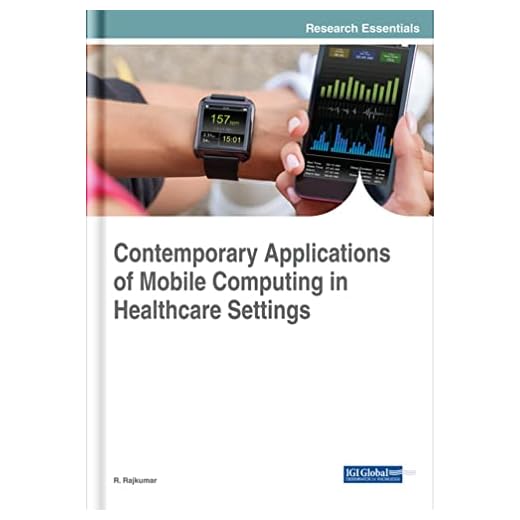



Mini PCs improve access to telehealth services by offering portable, cost-effective computing tailored for healthcare needs. Their compact size allows easy integration into medical carts and patient rooms, enhancing workspace organization. You'll benefit from secure access to electronic health records during virtual consultations, thanks to robust data management capabilities. Additionally, their powerful processors support high-quality video conferencing, ensuring clear communication between providers and patients. With built-in security features that comply with regulations, you can trust that sensitive information remains protected. As technology evolves, you'll find even more advancements in how telehealth becomes more accessible and effective.
Key Takeaways
- Mini PCs enable portable computing solutions, making telehealth consultations accessible in various healthcare settings, including patient rooms and medical carts.
- Their compact design ensures efficient use of space while maintaining necessary processing power for telehealth applications and video conferencing.
- Secure access to electronic health records enhances the quality of remote consultations, promoting timely interventions and improved patient care.
- Cost-effective compared to traditional desktops, mini PCs allow healthcare organizations to expand telehealth services without significant financial strain.
- Advanced security features ensure compliance with regulations like HIPAA, building trust between healthcare providers and patients during virtual consultations.
Mini PCs in Healthcare Settings
Mini PCs are increasingly becoming vital tools in healthcare settings. Their compact size allows for easy integration into medical carts and patient rooms, creating a seamless experience for healthcare professionals. With the ability to run sophisticated medical software, mini PCs enhance remote consultations and diagnostics, making telehealth services more accessible. Additionally, these devices can be configured as a NAS device, allowing for centralized data storage which is essential for patient management.
These devices support advanced networking capabilities, ensuring reliable connections for telehealth platforms and real-time remote patient monitoring. This connectivity is essential for healthcare professionals who need to access patient data quickly and efficiently during virtual consultations. Mini PCs also operate quietly with fanless designs, making them suitable for 24/7 use in medical environments without disturbing patients.
Moreover, their low power consumption contributes to sustainability in healthcare settings. Built-in security features protect sensitive patient information, ensuring compliance with regulations and maintaining patient privacy during telehealth interactions. By utilizing mini PCs, healthcare providers can enhance their telehealth services, offering patients timely and effective care without the need for extensive travel. Ultimately, mini PCs empower healthcare professionals to deliver high-quality healthcare solutions in a rapidly evolving digital landscape.
Enhancing Patient Information Access
Incorporating mini PCs in healthcare not only streamlines telehealth services but also greatly enhances access to patient information. With their compact design, mini PCs fit seamlessly into medical carts and patient rooms, allowing healthcare providers to swiftly access secure patient data without disrupting essential medical equipment. This quick access is essential during telehealth consultations, where timely decision-making can markedly impact patient outcomes. Additionally, their robust features support remote monitoring applications, which are important for managing patient information efficiently. Equipped with robust processing capabilities, mini PCs adeptly handle electronic health records (EHR) and patient data management systems. This efficiency reduces the risk of errors and improves data accuracy during remote consultations. Furthermore, mini PCs support encrypted communication channels, guaranteeing that patient information remains secure while accessing telehealth services. This compliance with data protection regulations like HIPAA instills confidence in both providers and patients.
Their remote access capabilities empower healthcare professionals to monitor patient information in real-time, enhancing response times and care quality. By utilizing mini PCs, you can ascertain that critical patient information is readily available, which ultimately leads to better healthcare delivery in a telehealth environment.
Integration With Medical Carts
The integration of mini PCs with medical carts revolutionizes the way healthcare providers deliver telehealth services. By mounting mini PCs on these carts, you gain immediate access to telehealth platforms directly from patient rooms or during rounds. This compact design guarantees that the workspace remains uncluttered, allowing for efficient use of space without obstructing other essential medical equipment. Additionally, mini PCs are equipped with adequate processing power and memory, which enhances the performance of telehealth applications and reduces latency during virtual consultations, making them an excellent choice for healthcare settings performance optimization achievable through SSDs.
Equipped with hot-swappable batteries, medical carts with integrated mini PCs can operate around the clock. This means you can maintain continuous access to telehealth services without being tethered to fixed power sources. Such flexibility is vital in fast-paced healthcare environments where timely responses are essential.
Moreover, mini PCs facilitate real-time monitoring and data transmission, enhancing your ability to offer timely virtual care. This integration not only streamlines workflows but also reduces downtime, enabling healthcare professionals to manage more patients effectively. Ultimately, the combination of mini PCs and medical carts supports improved efficiency in telehealth services, enhancing care delivery and guaranteeing that you can respond to patient needs promptly and effectively.
Video Conferencing Capabilities
Enhancing telehealth services with video conferencing capabilities is a game changer for patient-provider interactions. Mini PCs play a pivotal role in this transformation, as they can easily connect to existing monitors or TVs in patient rooms. This straightforward implementation allows for effective video conferencing, making virtual consultations more accessible.
Equipped with powerful processors, mini PCs facilitate high-quality video and audio, ensuring clear communication between healthcare professionals and patients. Their compact design allows for discreet placement in medical environments, optimizing space while enhancing video conferencing capabilities. By loading mini PCs with telehealth software, you can improve the efficiency of virtual consultations, enabling healthcare professionals to consult with multiple patients simultaneously without sacrificing service quality.
Reliable connectivity is essential for uninterrupted video conferencing sessions, and mini PCs excel in this area. This reliability is vital for effective remote patient monitoring, ensuring that healthcare providers can maintain consistent communication with their patients. As telehealth services continue to evolve, mini PCs provide the necessary tools to streamline interactions, enhance patient care, and improve overall healthcare delivery through advanced video conferencing capabilities.
Cost-Effectiveness of Mini PCs
When it comes to cost-effectiveness, mini PCs really shine as a budget-friendly option for healthcare organizations looking to adopt telehealth services. These compact devices provide a practical alternative to traditional desktop computers, allowing you to implement telehealth solutions without a hefty investment. Their low power consumption greatly helps reduce operating costs, enabling you to allocate resources more efficiently while enhancing your telehealth capabilities.
Mini PCs deliver the necessary computing power for telehealth applications at a fraction of the cost of larger systems, making it easier to expand access to virtual care services economically. Their scalability allows healthcare organizations to seamlessly increase their telehealth infrastructure as demand grows, sidestepping the need for costly overhauls of existing systems.
Additionally, mini PCs come equipped with built-in security features to protect sensitive patient information. This helps you maintain compliance with regulations while minimizing the financial burden associated with potential data breaches. Overall, investing in mini PCs not only makes financial sense but also supports the broader goal of improving access to essential healthcare services through telehealth.
Remote Monitoring and Support
As healthcare organizations increasingly adopt mini PCs for their cost-effectiveness in telehealth services, these devices also play a fundamental role in remote monitoring and support. Mini PCs seamlessly integrate with medical devices, allowing healthcare providers to track essential signs and health metrics in real-time from patients' homes. This capability makes remote monitoring more effective, providing continuous oversight that improves patient care.
Equipped with advanced networking capabilities, mini PCs guarantee reliable connectivity, which is critical for transmitting patient data and conducting virtual consultations. Their compact design allows for easy deployment in various healthcare settings, making them accessible tools for ongoing health assessments.
Moreover, mini PCs deliver powerful performance in a small form factor, efficiently processing and analyzing medical data. This enhances the accuracy of remote monitoring, ultimately leading to better patient outcomes. The cost-effectiveness of these devices empowers healthcare organizations to implement scalable remote monitoring solutions, increasing the accessibility of telehealth services, particularly for underserved populations. By bridging the gap between patients and providers, mini PCs greatly enhance the quality and reach of remote healthcare.
Security Features for Patient Data
In the domain of telehealth, ensuring the security of patient data is paramount, and mini PCs offer robust features designed to protect sensitive information. These devices incorporate advanced security features like TPM 2.0 and vPro™ technology, which provide hardware-based protection against data breaches and unauthorized access. This is particularly important in healthcare services where patient confidentiality is essential.
Mini PCs also boast built-in encryption capabilities that safeguard patient data during transmission, ensuring compliance with HIPAA regulations. This compliance is critical for maintaining trust between healthcare providers and patients during telehealth consultations. Additionally, the compact design of mini PCs allows for secure mounting in various healthcare settings, often using anti-microbial housing to prevent bacterial growth while protecting sensitive information.
Moreover, many mini PCs support secure connectivity options, such as Wi-Fi, Bluetooth, and 4G LTE, facilitating safe communication between providers and patients. The fanless operation of these devices reduces dust accumulation, minimizing potential security risks associated with physical contaminants. Together, these features make mini PCs an ideal choice for enhancing data security in telehealth environments.
Vendor Selection Criteria
Selecting the right vendor for mini PCs in telehealth is vital for guaranteeing ideal performance and security. When you evaluate potential vendors, focus on their range of customizable options. These should include various operating systems, processors, memory configurations, and security features tailored to meet your specific healthcare organization's needs.
Testing and demoing mini PCs before purchase is imperative. This allows you to assess their capability to handle telehealth applications and the required software and connectivity demands. Reliable vendor support is another significant factor; confirm the vendor offers long-term maintenance and upgrades, keeping your systems current with evolving telehealth technologies.
A thorough warranty and flexible return policy provide peace of mind. They enable you to evaluate the mini PCs' performance in real-world scenarios without undue risk. Additionally, consider vendors that offer worldwide support networks. This guarantees that any issues encountered can be quickly resolved, maintaining uninterrupted access to telehealth services.
Future of Telehealth With Mini PCS
The future of telehealth is poised for transformation, driven considerably by the adoption of mini PCs. These compact devices enhance telehealth services by offering healthcare professionals portable and powerful computing solutions, especially in underserved or rural areas. With mini PCs, remote consultations become seamless, allowing specialists to connect effectively with patients who may otherwise lack access to care.
The advanced networking capabilities of mini PCs facilitate reliable video conferencing and real-time patient monitoring, ensuring that healthcare providers can deliver quality care regardless of location. Additionally, the affordability of mini PCs compared to traditional desktops makes them an economically viable option for healthcare organizations looking to expand telehealth services without significant capital expenditure.
Equipped with built-in security features, mini PCs also safeguard sensitive patient information, ensuring compliance with healthcare regulations and maintaining trust in telehealth platforms. As the integration of mini PCs into telehealth solutions gains momentum, it's projected to support the growing demand for remote patient monitoring, with the market anticipated to reach $117 billion by 2025. In this evolving landscape, mini PCs are set to play a pivotal role in shaping the future of telehealth.
Disclosure: As an Amazon Associate, I earn from qualifying purchases.






